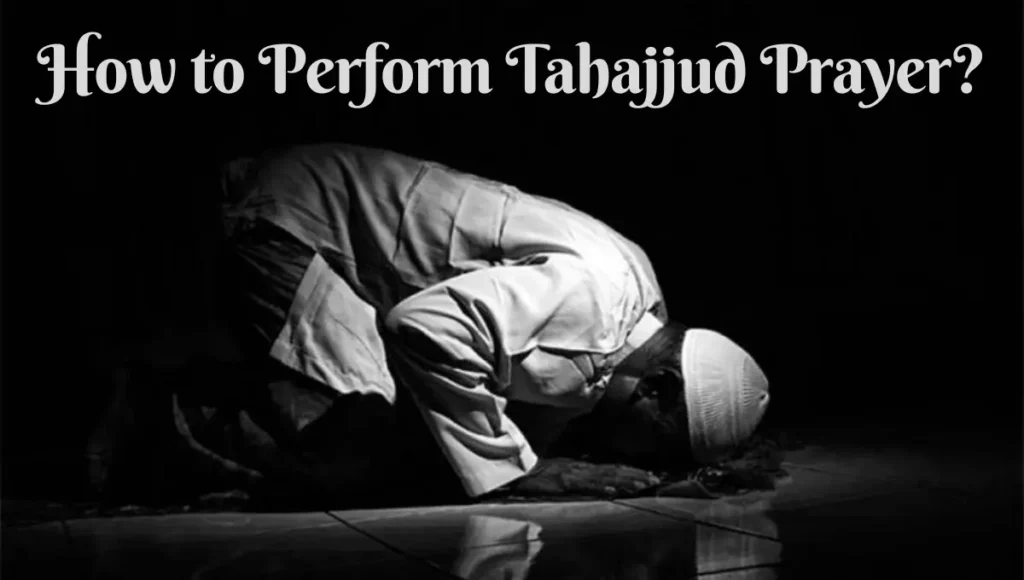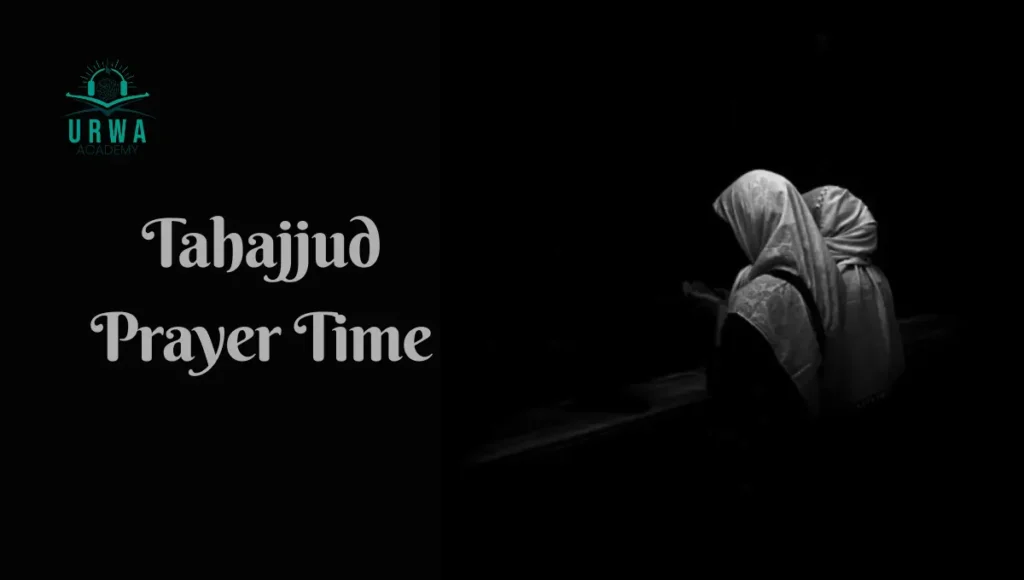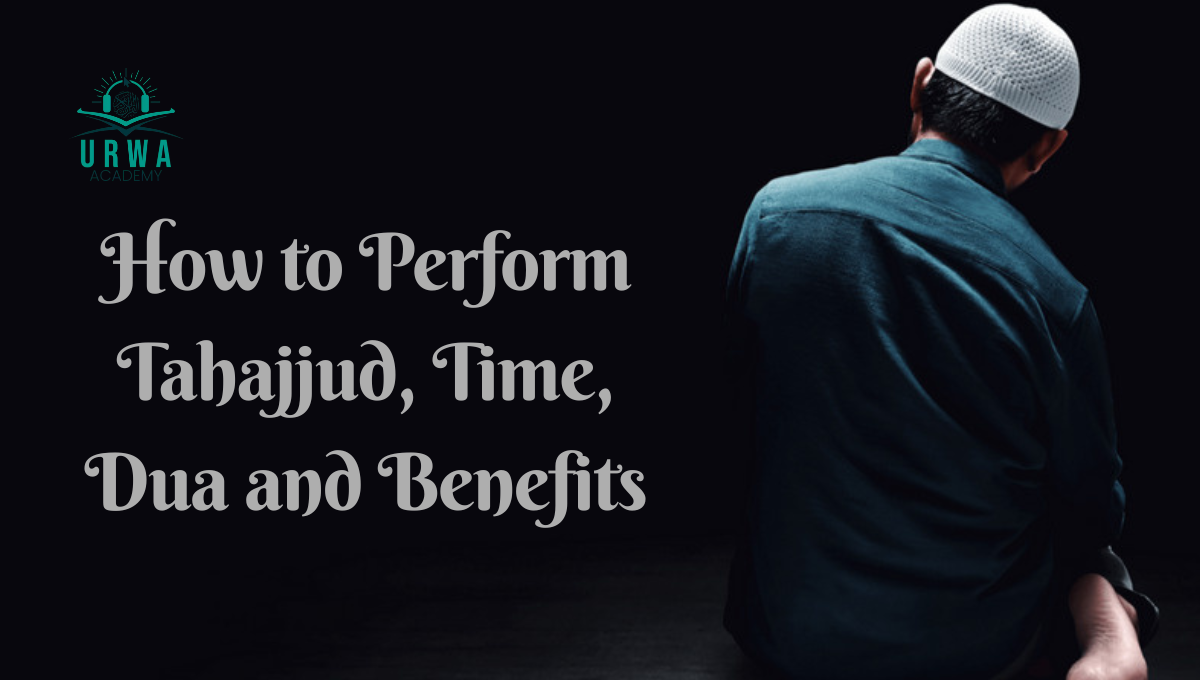Waking up in the middle of the night to perform the Tahajjud Prayer is one of the best and rewarding acts in Islam. When you perform Tahajjud, it brings peace to your heart, helps you directly connect with Allah, and opens the door for your duas to be answered.
Tahajjud, also known as the night prayer, is a special and deeply rewarding act of worship in Islam. It is an optional prayer that the Prophet Muhammad PBUH used to pray regularly, even in the quiet hours of the night. Many Muslims still wake up to pray it, hoping for its peace, closeness to Allah, and powerful blessings.
In this article, we will help you learn how to perform the Tahajjud prayer in detail, add the perfect time to perform it. Also, explain how many rakats are recommended, powerful duas to recite.
What Is Tahajjud Prayer?
Tahajjud is an optional prayer that Muslims perform at night after Isha and before Fajr. This is one of the most rewarding acts of worship in Islam, showing true devotion by waking up from sleep to connect with Allah.
As compared to the five prayers that are required daily, Tahajjud is voluntary, but Hazrat Muhammad PBUH highly recommended it and consistently prayed Tahajjud.
Basically, the word Tahajjud is derived from the word Hajada, which means to stay awake, highlighting its nature as a late-night form of worship.
Many Muslims perform the Tahajjud Prayer to ask for forgiveness, peace, guidance, or blessings in their personal lives. The calm timing and deep spiritual significance make it a powerful way to worship for those who want to draw closer to their Creator.
What Dua to Read in Tahajjud?
When waking up for Tahajjud, it’s recommended to start with this beautiful set of praises and supplications. Here’s how you can begin:
Recite each of the following ten times:
- اللّٰهُ أَكْبَر (Allah is the Greatest)
- الْـحَمْدُ لِلّٰه (All praise is for Allah)
- سُبْحَانَ اللّٰهِ وَبِحَمْدِهٖ (Glory is to Allah and all praise is for Him)
- سُبْحَانَ الْمَلِكِ الْقُدُّوْسِ (Glory is to the King, the Most Holy)
- أَسْتَغْفِرُ اللّٰهَ (I seek forgiveness from Allah)
- لَا إِلٰهَ إِلَّا اللّٰهُ (There is no god but Allah)
Then recite this powerful supplication (also ten times):
اللّٰهُمَّ إِنِّي أَعُوذُ بِكَ مِنْ ضِيقِ الدُّنْيَا وَضِيقِ يَوْمِ الْقِيَامَةِ
Translation: O Allah! I seek Your protection from the hardships of this world and the hardships of the Day of Judgment.
— (Sunan Abi Dawood, 7/418 – Beirut; Mishkat Sharif)
Second Dua to Read When Waking for Tahajjud:
اَلّٰلهُمَّ لَكَ الْحَمْدُ اَنْتَ قَیِّمُ السَّمٰوَاتِ وَالْاَرْضِ وَمَنْ فِیْھِنَّ، وَلَكَ الْحَمْدُ اَنْتَ نُوْرُ السَّمٰوَاتِ وَالْاَرْضِ وَمَنْ فِیْھِنَّ، وَلَكَ الْحَمْدُ اَنْتَ مَلِكُ السَّمٰوَاتِ وَالْاَرْضِ وَمَنْ فِیْھِنَّ، وَلَكَ الْحَمْدُ، اَنْتَ الْحَقُّ، وَوَعْدُكَ حَقٌّ، وَلِقَاؤُكَ حَقٌّ، وَقَوْلُكَ حَقٌّ، وَالْجَنَّةُ حَقٌّ، وَالنَّارُ حَقٌّ، وَالنَّبِیُّوْنَ حَقٌّ، وَمُحَمَّدٌ حَقٌّ، وَالسَّاعَةُ حَقٌّ۔ اَللّٰهُمَّ لَكَ اَسْلَمْتُ وَبِكَ اٰمَنْتُ، وَعَلَیْكَ تَوَكَّلْتُ، اِلَیْكَ اَنَبْتُ، وَبِكَ خَاصَمْتُ، وَاِلَیْكَ حَاكَمْتُ، فَاغْفِرْلِیْ مَاقَدَّمْتُ وَمَا اَخَّرْتُ وَمَا اَسْرَرْتُ وَمَا اَعْلَنْتُ، وَمَا اَنْتَ اَعْلَمُ بِهٖ مِنِّیْ، اَنْتَ الْمُقَدِّمُ، وَاَنْتَ الْمُؤَخِّرُ، لَا اِلٰهَ اِلَّا اَنْتَ وَلَا اِلٰهَ غَیْرُكَ۔
Translation: O Allah! All praise is for You. You are the Maintainer of the heavens and the earth and all that is in them. All praise is for You. You are the Light of the heavens and the earth and all that is in them. All praise is for You. You are the King of the heavens and the earth and all that is in them. All praise is for You. You are the Truth. Your promise is true. Meeting you is true. Your word is true. Paradise is true. Hell is true. All the Prophets are true. Muhammad ﷺ is true. The Final Hour is true.
O Allah! To you, I submit. In You, I believe. Upon you I rely. To you I turn. With your help, I argue. And to you I appeal for judgment. So forgive me for what I’ve done before and what I will do later, what I hide and what I disclose. You are the One Who advances and the One Who delays. There is no god but You. There is no deity besides You.
— (Sahih Bukhari, 2/60 – Cairo; Sahih Muslim, 2/184 – Beirut)
After this, you may begin your Tahajjud prayer.
Benefits of Tahajjud Prayer
The Tahajjud prayer offers a lot of spiritual, emotional, and personal benefits to those who practice it regularly. It is one of the most loved forms of worship and is seen as a way to receive Allah’s mercy and guidance.
- Make your connection with Allah stronger and deepen your spiritual awareness.
- Tahajjud helps you to get forgiveness and clear past sins.
- Provide peace of mind and remove stress and anxiety.
- There is a greater chance that your duas are accepted during the last third of the night.
- Builds discipline, sincerity
- Builds discipline, sincerity, and inner strength
- Encourages better sleep routines and mental clarity
- Opens the heart for divine guidance in difficult times
- Helps purify the soul and develop humility
- Acts as a source of barakah (blessings) in life, relationships, and work
How to Perform Tahajjud Prayer Step by Step?
Tahajjud is an optional prayer that is performed in the middle of the night and has great benefits. You can perform it after a period of sleep and before the Fajr prayer. Follow these steps to perform Tahajjud with understanding.

Preparation
Before starting, there are a few important steps to take for Tahajjud.
- Wake Up After a Night’s Sleep: You can perform Tahajjud after you wake up during the night, mostly in the last third of the night. It is best to sleep for a while before performing this prayer, as the prayer is meant to be done after sleep.
- Perform Wudu (Ablution): Like any other prayer, you must clean yourself by performing Wudu. This involves washing your hands, mouth, nose, face, arms, and feet to purify yourself before standing in front of Allah.
- Make Dua (Supplication): Before starting your prayer, make a short Dua, asking Allah for guidance, strength, and acceptance of your Tahajjud prayer.
Performing the Prayer
Once prepared, it’s time to perform the prayer. Follow these steps for each Rak’ah:
- Intention (Niyyah): The first step in performing Tahajjud is to make the intention in your heart that you are praying Tahajjud. This intention does not need to be spoken, but should be in your heart.
- Start with Takbir: Start by saying Allahu Akbar, Allah is the greatest, and raise your hand to your ears as you begin the prayer.
- Recite Surah Al-Fatiha: After that, recite Surah Al-Fatiha, the opening chapter of the Quran, aloud or quietly, depending on the environment.
- Ruku (Bowing): It’s time to do Ruku, bowing at the waist while keeping your back and head level. When you are in Ruku, say Subhana Rabbiyal Adheem three times.
- Stand Up: Return to the standing position and say Rabbighfirli.
- Sajda (Prostration): Then go in Sajda, the prostration, and say Subhana Rabbiyal A’la. It is a time for being humble and making supplications to Allah.
- Repeat the Cycle: Repeat the cycle of standing, bowing, and prostrating for the first Rak’ah.
- Second Raka: In the second Rak’ah, you will have to follow the same steps as you do in the first Rak’ah. Like reciting Al-Fatiha, followed by other Surahs, then Ruku, Sajda, and sitting for the Tashahhud.
- Recite Tashahhud: When the second Rak’ah is completed, sit in the Tashahhud position and recite dua, which contains the statement of faith, “Ashhadu alla ilaha illallah wahdahu la sharika lahu wa ashhadu anna Muhammad abduhoo wa rasooluh.” which means I bear witness that there is no deity but Allah, and Muhammad is His servant and messenger.
- Salutation: For completing the prayer, turn your head to the right and then to the left, saying Assalamu Alaykum Wa Rahmatullahi Wa Barakatuh (Peace be upon you and the mercy of Allah and His blessings).
Continue with More Rakahs (Optional)
It is not done at all because you can continue the prayer with more Rak’ahs if you wish. The minimum is two Rak’ahs, but you can perform as many as you like.
- Pray in Pairs: Suggesting that you pray Tahajjud in pairs of two Rak’ahs. This helps you to manage focus and stability throughout the prayers.
- Pray Witr (Optional): You can also add Witr prayer to finish the Tahajjud, which is one Rak’ah at the end of your night worship. Witr is a way to complete Tahajjud and make a number of prayers odd.
Tahajjud Prayer Time
Tahajjud is a peaceful and most rewarding act of worship. As it can be done at any time after Isha and before Fajr, there are special times during the night when it is most powerful. Let’s break down exactly when and how to get blessed in this moment.

When Can You Pray Tahajjud?
You can perform Tahajjud after completing the Isha prayers and before the time of Fajr prayer. Between this whole moment after Isha and before Fajr, you can perform Tahajjud.
Best Time to Pray Tahajjud
The best time for performing Tahajjud is the last third of the night. This is when the night is calm, there are no distractions, and your heart is more connected. It is also the time when Allah is closest to His servant, accepting duas and forgiving sins.
How to Calculate the Last Third of the Night?
Are you confused about the last third time? You will need to know the time between Maghrib and Fajr. Divide that time into three equal parts.
Example: If Maghrib is at 8:00 PM and Fajr is at 5:30 AM, there are 9 hours and 30 minutes between them.
- Divide that by 3 = 3 hours and 10 minutes.
- The last third starts at 11:10 PM and lasts until Fajr.
That window, from around 11:10 PM to 5:30 AM, is the golden time for Tahajjud prayer.
Why This Time Is So Special?
During the last third of the night, Allah descends to the lowest heaven, listening to the prayers of those who are awake, asking:
“Is there anyone seeking forgiveness so I may forgive him? Is there anyone asking so I may grant him?”
This sacred moment is your chance to ask for anything—whether it’s for guidance, healing, marriage, success, or peace.
How to Prepare for Tahajjud?
- Perform Wudu (ablution) to cleanse yourself before prayer.
- Choose a quiet and clean place where you won’t be disturbed.
- Make a sincere intention to connect with Allah.
- Decide how many Rakats you want to offer (2 to 8 or more).
Even two sincere Rakats offered at this time can bring unimaginable blessings.
How Many Rakats in Tahajjud?
Tahajjud prayer is a beautiful, optional act of worship performed during the night. While the number of Rakats can vary, knowing the recommended way to pray it can help you gain the most benefit from this special prayer.
Structure of Tahajjud Prayer
You can perform Tahajjud in sets of two rakats. It is done by completing two rakats first and then again performing two rakats, and the best thing is that you can continue it as you want. This structure helps you to pray Tahajjud in segments, especially when you are waking up during the night.
No Fixed Limit on Rakats
The best thing is that the Tahajjud prayer has no fixed limits on how many rakats you can pray. As a voluntary prayer, the number of rakats depends on you. The more rakats you pray, the greater reward you get, but do not forget that every prayer is accepted by Allah.
Recommended Number of Rakats
Although there’s no specific number required, it’s common to pray four to eight rakats. The Prophet Muhammad (peace be upon him) used to offer Tahajjud in sets of two rakats, and many people follow this practice. You can pray as few or as many rakats as you are comfortable with, depending on your time and energy.
Ending the Prayer with Witr
After you have completed the sets of two rakats, it is suggested to end your Tahajjud prayer with one Witr rak’ah. The Witr prayer is an odd-numbered prayer and it serves as the conclusion to your night prayer. It adds extra blessings and finally to your worship.
Tahajjud Prayer for Specific Needs
The Tahajjud prayer is a powerful act of worship that offers an opportunity for individuals to connect deeply with Allah and ask for His help for different personal needs. Here, we provide some specific ways you can use the Tahajjud prayer to ask for your personal desires and needs.
Seeking Marriage through Tahajjud Dua
Most of the people looking for a marriage partner turn to the Tahajjud prayer, which is a blessed time for asking Allah for guidance and assistance. Here is how you can use Tahajjud to pray for marriage:
- Make a Sincere Intention: Start by deciding in your heart that you are praying to ask Allah for a good and kind life partner. This is an important step because it shows the reason behind your prayer.
- Perform the Tahajjud Prayer: Follow the regular Tahajjud prayer steps and wake up after a night’s sleep, do Wudu, and offer two or more Rak’ahs.
- Make a Dua for Marriage: When you are in the position of prostration at that time, make a dua to Allah heartfully and ask for a suitable partner, like you can pray, pray“Ya Allah, bless me with a partner who will be the coolness of my eyes and a source of peace and joy.”
- Recommended Dua for Marriage: One of the powerful duas for seeking marriage is the Dua for a righteous spouse:
“اللهم ارزقني زوجاً صالحاً وارزقني ذرية طيبة”
“O Allah, grant me a righteous spouse and bless me with good offspring.” - Pray with Patience and Faith: While making dua, always keep a stronger faith that Allah will answer your prayer in His own perfect time. The last third of the night is the time of blessing. At that time, Allah descends to the lowest heaven and answers the supplications of His believers.
Other Personal Supplications during Tahajjud
Along with praying for marriage, the Tahajjud prayer is the best time for seeking your other personal supplications like health, wealth, career, or spiritual growth.
- Best Time for Personal Supplications: The most blessed time is during the last third of the night. At this time, you can pray to Allah for your personal needs. This is the time when Allah promises to answer the prayers of those who are seeking His mercy.
- Dua for Health: Many people pray to Allah for their health or recovery from illness for this, you can make dua like:
“اللهم اشفني شفاء لا يغادر سقماً”
“O Allah, cure me with a cure that leaves no trace of illness.” - Dua for Financial Relief: If you want to pray for financial relief, then you can pray:
“اللهم اجعل رزقي حلالاً طيباً مباركاً فيه”
“O Allah, make my sustenance lawful, pure, and blessed.” - Dua for Guidance: If you are struggling and need guidance in your life, then you can pray to Allah like this to seek guidance.
“اللهم أرني الحق حقاً وارزقني اتباعه”
“O Allah, show me the truth as truth and grant me the ability to follow it.” - Special Requests: You can pray for everything; there are no limits, just as long as it is within the bounds of what is good and beneficial for you in this world.
FAQs About Tahajjud Prayer
Final Verdict
Tahajjud prayers offer many spiritual benefits and are a powerful way to connect with Allah. In contrast, perform this voluntary prayer with sincerity. You open the doors to blessings and mercy. If you want to ask for something personally or want to get closer to Allah, Tahajjud is a time for reflection and prayer. It’s a chance to connect with Allah, seek His guidance, and make supplications. Take full advantage of this special time to strengthen your faith and devotion.

